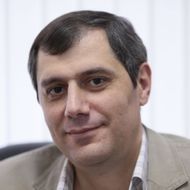- A
- A
- A
- АБB
- АБB
- АБB
- А
- А
- А
- А
- А
-
Департамент
-
Кафедры
-
Лаборатории
-
Проектные группы
Адрес: 109028, г. Москва, Покровский бульвар, д. 11
Телефон: +7(495) 772-95-90 *28240
Департамент программной инженерии был создан в 2014 году на базе отделения программной инженерии. В департаменте ведутся исследования по различным современным научным направлениям, в число которых входят: анализ и моделирование бизнес процессов, математическое моделирование, машинное обучение и искусственный интеллект, нечеткая логика, процессно-ориентированные информационные системы.
В печати
Hank-Debain Djambong Tenkeu, Alexandrov D.
Vol. 37. Iss. 5. Institute for System Programming of the RAS, 2025.
Василевский В. И., Alexandrov D.
Proceedings of the Institute for System Programming of the RAS. 2025. Vol. 37. No. 5. P. 173-182.
Красноженов Г. Г., Лебедев С. А.
В кн.: Московский транспорт. Наука и проектирование.. Вып. 3. М.: 2025. С. 56-74.
В печати
Ryabtsev D., Vasilyev Boris, Shershakov S.
Computer Science ::Computer Vision and Pattern Recognition. 2501.14689. arXiv, 2025
Экосистемы интернета вещей
The course introduces Internet of Things field of computer science and hardware implementation including terminology, basic concepts, various areas of its application and different approaches to building its software and using its hardware with different kinds of system on modules. Lecture topics include physics on electrical schemes and networking, different kinds of the things themselves, various fields of the things implementation, software needed to code the things behaviour and store the data including Internet of Things operating systems. During the practice classes students have a lot of assignments based on two hardware platforms: Arduino Uno and Raspberry Pi 3 with Arduino IDE and Android Studio for Android Things OS respectively. Then students are given a home assignment which can replace the course exam. The assignment is a hardware-software project based on a simple network of the things and has a certain purpose (smart home, smart weather station, smart plant, smart lock etc.). The assignment is divided into two parts: the first part is hardware (with systems on module mentioned and various sensors, controls, LEDs etc.) and the second part is software (mobile application) controlling the hardware. There is an exam in the end of the course studies. This course is practice oriented - more attention is given to practice, not lectures.
- О ВЫШКЕ
- Цифры и факты
- Руководство и структура
- Устойчивое развитие в НИУ ВШЭ
- Преподаватели и сотрудники
- Корпуса и общежития
- Закупки
- Обращения граждан в НИУ ВШЭ
- Фонд целевого капитала
- Противодействие коррупции
- Сведения о доходах, расходах, об имуществе и обязательствах имущественного характера
- Сведения об образовательной организации
- Людям с ограниченными возможностями здоровья
- Единая платежная страница
- Работа в Вышке
- ОБРАЗОВАНИЕ
- Лицей
- Довузовская подготовка
- Олимпиады
- Прием в бакалавриат
- Вышка+
- Прием в магистратуру
- Аспирантура
- Дополнительное образование
- Центр развития карьеры
- Бизнес-инкубатор ВШЭ
- Образовательные партнерства
- Обратная связь и взаимодействие с получателями услуг
-
http://www.minobrnauki.gov.ru/
Министерство науки и высшего образования РФ
-
https://edu.gov.ru/
Министерство просвещения РФ
-
http://www.edu.ru
Федеральный портал «Российское образование»
-
https://elearning.hse.ru/mooc
Массовые открытые онлайн-курсы
- © НИУ ВШЭ 1993–2026 Адреса и контакты Условия использования материалов Политика конфиденциальности Карта сайта
- Редактору



